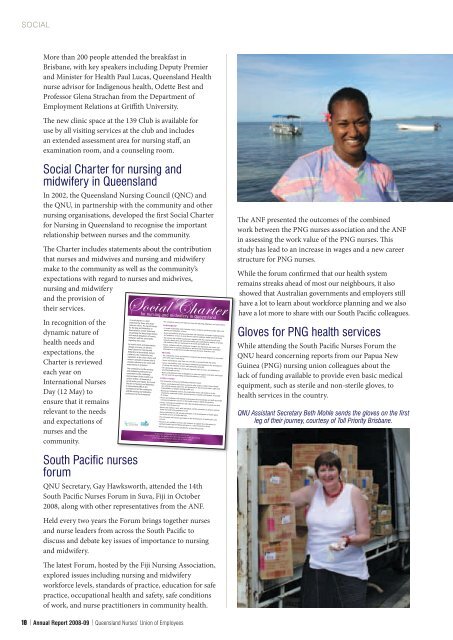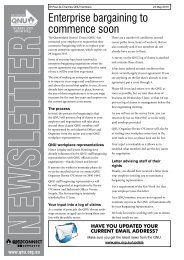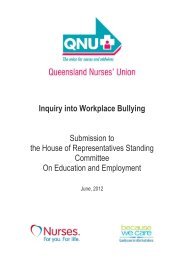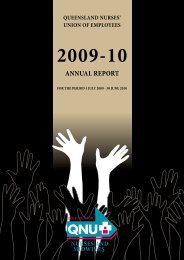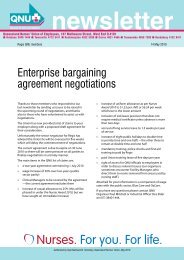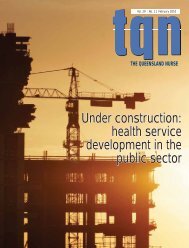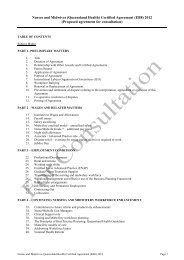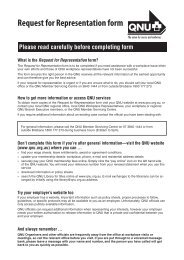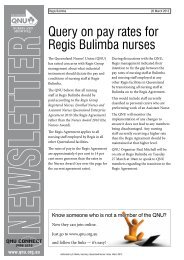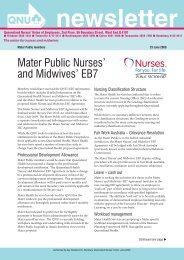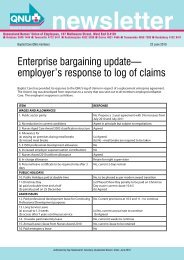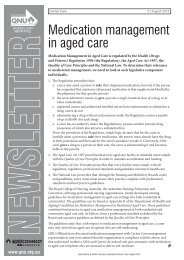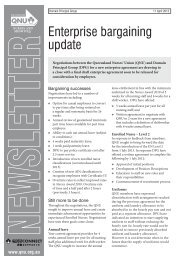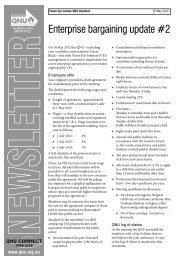QNU Annual Report 08-09.indd - Queensland Nurses Union
QNU Annual Report 08-09.indd - Queensland Nurses Union
QNU Annual Report 08-09.indd - Queensland Nurses Union
Create successful ePaper yourself
Turn your PDF publications into a flip-book with our unique Google optimized e-Paper software.
SOCIAL<br />
More than 200 people attended the breakfast in<br />
Brisbane, with key speakers including Deputy Premier<br />
and Minister for Health Paul Lucas, <strong>Queensland</strong> Health<br />
nurse advisor for Indigenous health, Odette Best and<br />
Professor Glena Strachan from the Department of<br />
Employment Relations at Griffith University.<br />
The new clinic space at the 139 Club is available for<br />
use by all visiting services at the club and includes<br />
an extended assessment area for nursing staff, an<br />
examination room, and a counseling room.<br />
Social Charter for nursing and<br />
midwifery in <strong>Queensland</strong><br />
In 2002, the <strong>Queensland</strong> Nursing Council (QNC) and<br />
the <strong>QNU</strong>, in partnership with the community and other<br />
nursing organisations, developed the first Social Charter<br />
for Nursing in <strong>Queensland</strong> to recognise the important<br />
relationship between nurses and the community.<br />
The Charter includes statements about the contribution<br />
that nurses and midwives and nursing and midwifery<br />
make to the community as well as the community’s<br />
expectations with regard to nurses and midwives,<br />
nursing and midwifery<br />
and the provision of<br />
their services.<br />
In recognition of the<br />
dynamic nature of<br />
health needs and<br />
expectations, the<br />
Charter is reviewed<br />
each year on<br />
International <strong>Nurses</strong><br />
Day (12 May) to<br />
ensure that it remains<br />
relevant to the needs<br />
and expectations of<br />
nurses and the<br />
community.<br />
South Pacific nurses<br />
forum<br />
Social Charter<br />
A social charter is a joint<br />
statement by those who share<br />
common views. The Social Charter<br />
for Nursing and Midwifery in<br />
<strong>Queensland</strong> is a brief statement<br />
recognising the broad expectations<br />
and mutual obligations of nurses,<br />
midwives and the community<br />
regarding their roles.<br />
As health needs and expectations<br />
change over time, so will the<br />
Social Charter for Nursing and<br />
Midwifery in <strong>Queensland</strong>. <strong>Nurses</strong>,<br />
midwives, the community and<br />
signatories to the social charter will<br />
review it annually to ensure that it<br />
remains relevant to the needs and<br />
expectations of all parties.<br />
The community and the nursing<br />
and midwifery professions are<br />
committed to the continuing<br />
improvement of the health care<br />
system within a framework of<br />
social justice and equity. The Social<br />
Charter for Nursing and Midwifery<br />
in <strong>Queensland</strong> reflects the<br />
commitment of the community<br />
and the nursing and midwifery<br />
professions to this framework.<br />
for nursing and midwifery in <strong>Queensland</strong><br />
The community, nurses and midwives have the following obligations and expectations:<br />
PARTNERSHIP<br />
A unique relationship exists between nurses, midwives and those people who seek<br />
nursing and midwifery services.<br />
<strong>Nurses</strong> and midwives develop partnerships with individuals and groups requiring nursing<br />
and midwifery services to assist them to achieve optimum health and well-being.<br />
The nursing and midwifery professions together with the community will work<br />
towards creating new and innovative health policy and effective models of nursing<br />
and midwifery that are responsive to the needs and rights of all.<br />
<strong>Nurses</strong>, midwives and the community recognise the important role nurses and<br />
midwives have in ensuring individuals are provided with comprehensive, meaningful<br />
information to enable them to make informed decisions about their care.<br />
To become a signatory to the Social Charter,<br />
please contact either the <strong>Queensland</strong> Nursing Council on 07 3223 5126<br />
or the <strong>Queensland</strong> <strong>Nurses</strong> <strong>Union</strong> on 07 3840 1444<br />
Published 2002, Amended 2009<br />
<strong>QNU</strong> Secretary, Gay Hawksworth, attended the 14th<br />
South Pacific <strong>Nurses</strong> Forum in Suva, Fiji in October<br />
20<strong>08</strong>, along with other representatives from the ANF.<br />
Held every two years the Forum brings together nurses<br />
and nurse leaders from across the South Pacific to<br />
discuss and debate key issues of importance to nursing<br />
and midwifery.<br />
The latest Forum, hosted by the Fiji Nursing Association,<br />
explored issues including nursing and midwifery<br />
workforce levels, standards of practice, education for safe<br />
practice, occupational health and safety, safe conditions<br />
of work, and nurse practitioners in community health.<br />
VALUING<br />
The community, nurses and midwives recognise their mutual obligation to treat each<br />
other with respect and dignity.<br />
<strong>Nurses</strong> and midwives value their own and other’s personal health and safety.<br />
<strong>Nurses</strong> and midwives value and support community participation in the development<br />
of nursing and midwifery services and health policy generally.<br />
The community values the varied and important roles of nurses and midwives in<br />
providing health services.<br />
<strong>Nurses</strong> and midwives have an obligation to value and support each other and respect<br />
the role each has in providing nursing and midwifery services.<br />
EXPECTATIONS<br />
The community, nursing and midwifery profession expect:<br />
<strong>Nurses</strong> and midwives will strive to promote safe, quality, evidence-based health<br />
care with the utmost respect for, and protection of, the personal values, rights and<br />
responsibilities of people needing health care.<br />
Nursing and midwifery services are provided by nurses and midwives in the<br />
community, residential facilities, general practice, hospitals and hospices for people<br />
of all ages.<br />
<strong>Nurses</strong> and midwives will maintain and advance their knowledge and skills to provide<br />
nursing and midwifery services in the health setting in which they practise.<br />
<strong>Nurses</strong> and midwives collaborate with other health practitioners to provide the best<br />
possible client focused care.<br />
<strong>Nurses</strong> and midwives work with individuals and the community to achieve optimal<br />
health and well-being outcomes for all.<br />
<strong>Nurses</strong> and midwives will actively participate in the development of health policy<br />
and health services at leadership level.<br />
The community will actively participate in the development of health policy and<br />
services.<br />
Resources are available to nurses and midwives to support the achievement of<br />
optimum health and well-being outcomes in a safe environment for all.<br />
<strong>Nurses</strong> and midwifes are accountable for services they provide.<br />
The ANF presented the outcomes of the combined<br />
work between the PNG nurses association and the ANF<br />
in assessing the work value of the PNG nurses. This<br />
study has lead to an increase in wages and a new career<br />
structure for PNG nurses.<br />
While the forum confirmed that our health system<br />
remains streaks ahead of most our neighbours, it also<br />
showed that Australian governments and employers still<br />
have a lot to learn about workforce planning and we also<br />
have a lot more to share with our South Pacific colleagues.<br />
Gloves for PNG health services<br />
While attending the South Pacific <strong>Nurses</strong> Forum the<br />
<strong>QNU</strong> heard concerning reports from our Papua New<br />
Guinea (PNG) nursing union colleagues about the<br />
lack of funding available to provide even basic medical<br />
equipment, such as sterile and non-sterile gloves, to<br />
health services in the country.<br />
<strong>QNU</strong> Assistant Secretary Beth Mohle sends the gloves on the first<br />
leg of their journey, courtesy of Toll Priority Brisbane.<br />
18 | <strong>Annual</strong> <strong>Report</strong> 20<strong>08</strong>-09 | <strong>Queensland</strong> <strong>Nurses</strong>’ <strong>Union</strong> of Employees


